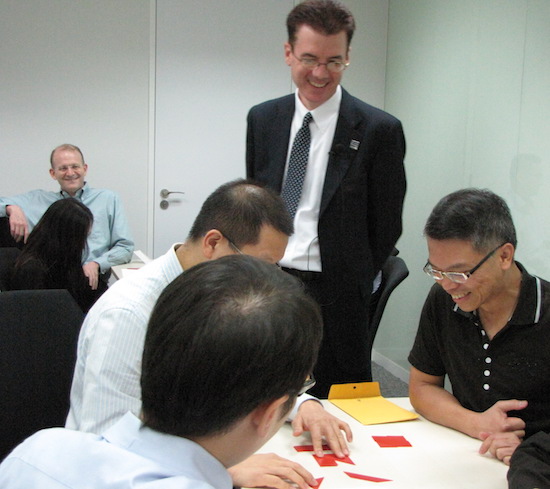
Red Squares exercize at the 2 1/2 Deming Seminar in Hong Kong (2014).
As a speaker or coach or teacher it is wise to learn what impacts how people absorb information and learn. Factoring those ideas into how you communicate (one on one, coaching, training, presenting…) is wise.
Learning about how people learn and remember is important to allow you to communite well. And most people seem to understand this. But they also seem to have no shame in not improving their performance in relation to these common weaknesses.
I have never understood why so many people talk about weaknesses in how people learn (people only remember “10% of what they hear, 20% of what they read, and 80% of what they see and do”; you must repeat something 7,9,12… times before most people will remember it; people will retain more if they are given concrete examples relevant to them; people will remember more if they speak or write than if they just passively listen; a good visual will make an idea presented much more likely to be remembered…) but never seem to seek to improve their weaknesses in these areas.
Yes, it is harder for us to retain new information when we just hear about it or if good information is presented poorly. But if you do a much better job of learning and succeed in retaining what you hear or see (even if often people fail to do this well) you will be better off.
Yet what I see is people spouting these statistics, not as a way of learning what they need to improve themselves but as a way of explaining that it is inevitable and they won’t do any better (or even bother to attempt to do so). It just isn’t true that you can’t do better. You can train yourself to learn more than most people when the material is presented in a less than perfect manner by learning how we commonly fail to learn and making efforts to do better yourself.
Sure, learn these common traits to know how you need to take them into account when communicating with others. But also examine yourself and see if you have the same weaknesses and improve in those areas you are weak. Also you can learn from them how to be more successful in retaining good ideas (write them down, think about applying them in your context, make a note to actually apply them at work tomorrow or next week…). You can blame whoever was communicating the ideas to you for failing to present it as well as they should but that won’t help you learn more.
Also companies would be wise to put more effort into helping people learn better. I see lots of focus on how presenters should do better, but very little on how people can improve their capacity to listen and learn. Yes, those presenting should continually seek to improve and be aware of their customers (those they are communicating with). Those that are learning should also seek to improve their ability to learn, even if the way material is presented isn’t optimal.
By the way, you might also want to question much of the claims of what people remember: Mythical Retention Data & The Corrupted Cone.
Related: Effective Communication is Explicit – Communicating Change – How Could They Know? They could learn about the job they were paid to do. – A Powerful Tool for Learning: The Capacity Matrix


Pingback: Carnival of HR - Post-Primary Hangover Edition - HR reMix